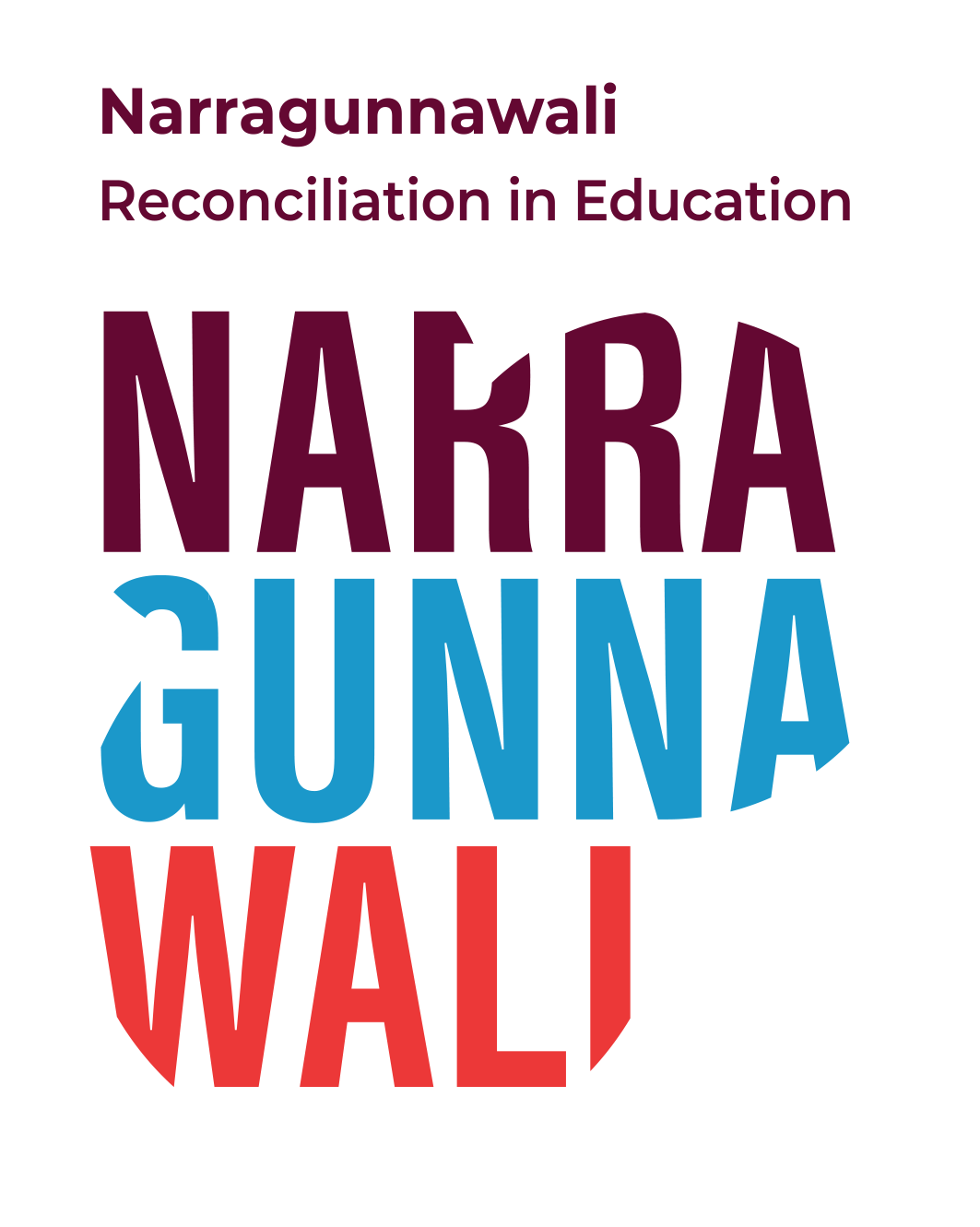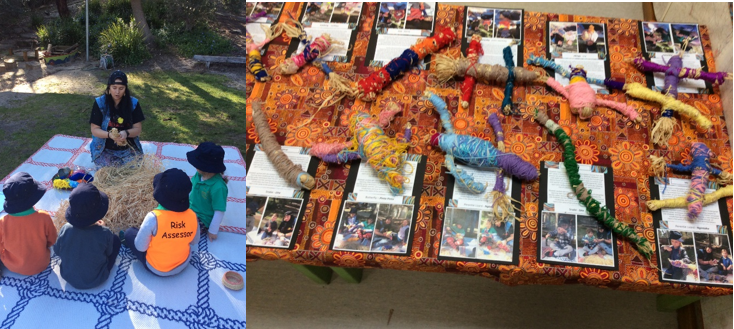Spotlight On – Coromandel Valley Kindergarten, SA
Elizabeth Yanyi Close running a Tjanpi (spinifex grass) weaving workshop with the children.
Despite the unique challenges of COVID-19, droughts, fires and floods around the country, reconciliation in education continues to be a priority for the Narragunnawali community.
Director Jen Melta and preschool teacher Rikki Skrødal, both at Coromandel Valley Kindergarten (CVK) in South Australia, had to get creative and think outside the box continuing reconciliation activities at home in lockdown, in the service, and safely with the local community and organisations.
The team at CVK—also including Suzanne Harris (preschool teacher), Michelle Sibbons (preschool teacher), and Louise Hill (early childhood worker)—haven’t shied away from the tougher content areas and truth-telling in an age-appropriate way.
“Part of our journey developing our RAP has been making sure we are covering important information and not changing the facts of it no matter how horrendous or inconvenient they may be,” said Jen.
“We’re embracing the concept of ‘don’t let history be a mystery’, but having said that we are mindful of the age group of our very young preschoolers and that some of the information is particularly brutal and quite likely frightening for a young child.”
Power in local truth-telling
Colebrook Reconciliation Park—located in the Mitcham Hills area—has been a crucial part of building partnerships with community. It is the site of the former Colebrook Home, which was a place where Aboriginal children were brought from all over South Australia. It was closed and demolished by 1973, and is now a reconciliation memorial that some of its past residents Tji Tji Tjuta (Pitjantjatjara, meaning many small children), second generation Tji Tji Tjuta and community groups now use as a shared learning space to help heal the depth of hurt and disconnect that is still felt by many today.
One of the projects at Colebrook Reconciliation Park is the storyboard produced by the Blackwood Reconciliation Group, Bush Games and Knucklebones. Published by Magabala Books, it was written and illustrated by Stolen Generations members Auntie Doris (deceased) and Kunyi June-Anne McInerney, and is used as a regular learning experience and resource by CVK.
As Jen explains, “We choose to focus on this story in our Kindergarten, and encourage our families to visit the park to see the beautiful installations on site which have been carefully developed as a place to learn, reflect and contemplate for all communities.
We encourage children’s questions and curiosity, we are honest and sensitive with our responses and work closely with families to unpack this information.”
Reconciliation in lockdown
Despite COVID-19 being a challenge, CVK have continued to lead with reconciliation and their RAP is integral to the weekly and term plan, asking every day ‘what did I do today to help reconciliation?’
When lockdown periods were uncertain and events had to be changed, they livestreamed a Welcome to Country by Mickey Kumatpi Marrutya O’Brien, and the entire team built reconciliation into their 10-week plans for home-schooling.
For the safety of Community, while in-person meetings couldn’t occur, they made sure to phone their Cultural Consultants Uncle (Moogy) Major Sumner (Ngarrindjeri, Kaurna), Karrl Tamaru Smith (Kaurna), and Haydyn Bromley (Adnyamathanha, Narungga, Yarluyandi) to consult and help to co-produce RAP take-home packages and resources to ensure what they were using was appropriate, safe and accurate before sending it home to families.
Once restrictions eased, CVK invited local resident and Pitjantjatjara Yunkunytjatjara artist Elizabeth Yanyi Close in to work with the children on art that was close to her heart from the APY lands, Tjanpi (spinifex and wool weaving).
In early February 2021, CVK hosted a family picnic and invited Ms Eunice (deceased), a Narungga, Ngadjuri, Ngarrindjeri, Kaurna, Ngukkur, Kokatha singer and songwriter, to do a Welcome to Country, sing beautiful songs with the children, along with an emotional flag raising ceremony. She will be dearly missed.
National Reconciliation Week 2021
When asked about the National Reconciliation Week 2021 theme, More than a word. Reconciliation takes action, CVK listed the following on how they are going to enact it:
-
continuing with all the work we do on a daily basis by connecting to community to respectfully embed Kaurna language, Aboriginal art, songs and appropriate culture into our curriculum
-
making sure there is a significant site budget line for the RAP
-
connecting with other sites with a RAP and being on their advisory group
-
mentoring sites that are at the beginning stages of their RAP and reconciliation journey
-
making time to meet with and support the work of Blackwood Reconciliation Group—one of our staff is an executive member on the working committee
-
staff attending targeted training and workshops on Kaurna language revival
-
influencing leadership meetings by participating in an opportunity for each educational site in our partnership to offer an Acknowledgement of Country at meetings
-
making a statement on our letterhead stationery and emails—this year: be the change that you want to see, celebrating reconciliation
-
18 Apr 2024NATIONAL RECONCILIATION WEEK 2024 CURRICULUM RESOURCES
-
18 Apr 2024Teacher Feature – Sherri Bryers, Tasmania
-
18 Apr 2024Civil Discourse: Post-Referendum for schools


